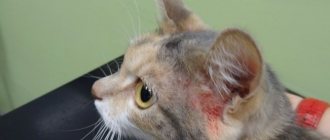Domestic cats bring owners a lot of positive emotions. However, there are also disappointments, for example, if the pet bites or scratches. In some cases, this entails not only a spoiled mood, but also a threat to health.
- 2 First aid
- 3 When do you need a doctor?
3.1 Video: doctor about pet bites
- 4.1 Drug therapy
- 5.1 Video: in the Kama region, a teenager died after being bitten by a cat
- 6.1 Video: how to pet a cat to avoid scratches
The danger of cat bites and scratches for humans
In nature, there are diseases that are equally dangerous for people and animals. They are provoked by a variety of infections and parasites that are brought to people by domestic cats or stray yard animals. People's love for pets does not become a barrier against blood poisoning, tetanus, rabies, and lichen. The list of serious diseases that can be contracted from their bites and scratches includes toxoplasmosis, salmonellosis, giardiasis, roundworms, scabies, chlamydia, felinosis, etc.
Domestic cats' claws are long and sharp
Bites from sharp and thin cat teeth, deep scratches from claws never remain without negative consequences. It would seem that a cat scratched, many people think that if it is domestic, it is not scary, but as a result, puncture and lacerated deep wounds are formed. They get dirt, animal saliva, filled with pathogens that cause infections in more than half of the attacks. Dangerous microorganisms, which are found in 90% of domestic cats, enter the lower layers of the epidermis and cause suppuration with complications, including septic manifestations.
Most often, cats damage the skin on their hands. If bites and scratches are deep, tendons, muscles, joints, nerve fibers, veins and blood capillaries may become damaged and become inflamed. Moving through the bloodstream, pathogens are able to reach the heart, liver, spleen, lungs, and brain. Of all the infections that animals, especially homeless animals, can infect people with, the most dangerous and deadly is rabies. This disease was described by doctors alive 3 thousand years BC. It has not yet been eradicated, which is why you need to be especially careful when handling animals.
Important! Vaccination of domestic dogs and cats against rabies is a mandatory procedure in Russia.
Traces of cat bites and scratches
What not to do
If you are scratched or bitten by a cat, it is quite possible to provide yourself with the necessary first aid yourself. But you should not overdo it, as some actions can only aggravate the condition. To ensure healing goes quickly and without consequences, remember that :
- There is no need to stop the bleeding quickly. With the first drops of blood, an infection can potentially come out and inflammation can be avoided.
- There is no need to apply a tight bandage, and you should not cover the wound site with dressing material. This increases the likelihood of inflammation and suppuration.
- There is no need to remove swelling on your own. Swelling of the tissue indicates a high likelihood of infection developing in the area where the cat scratched you. Delaying seeking medical help may result in the need for serious medical intervention.
What can you get infected from cat scratches?
Domestic vaccinated cats cannot infect humans with rabies through a shallow scratch. If the animal is sick with rabies, if it was scratched by a street cat, then even a small damage to the skin can become a gateway for the animal’s saliva to get into the wound. After all, in a sick animal, saliva filled with pathogens flows from the mouth, contaminating the fur, paws, and claws.
How to help a cat in the heat: examples of what you can do
Cats become carriers of streptococcal, staphylococcal infections, bacteria of the genus Pasteurella. Certain representatives of the genus Pasteurella provoke cholera in domestic chickens; the species Pasteurella pestis is the causative agent of plague in rats. From them they can get to rat-catching cats, and then to humans.
There is, albeit a small, chance of HIV infection due to a cat scratch. This can happen during communication between a healthy and a sick person, who at the same time were scratched until they bled by an animal. Feline AIDS is not transmitted to humans.
For some people scratched by cats, infection with Bartonella bacteria also becomes dangerous.
Important! Any home first aid kit should contain ointments for cat scratches in case of situations of injury to people when playing with animals or unexpected attacks by cats.
Homeless rat-catcher cat
When do you need a doctor?
As already mentioned, in some cases you will have to consult a doctor. The already mentioned symptoms will be a signal to seek medical help:
- swelling at the site of the bite or scratch;
- swelling of the hand or other bitten limb;
- bleeding that does not stop or renews;
- elevated temperature;
- numbness of the injured area;
- wound suppuration;
- loss of consciousness.
In general, temperature can be a signal from the body to fight bacteria. However, if it is accompanied by swelling, this is always a bad sign. A tumor is a signal that the body cannot cope with an infection (and this could be, for example, dangerous tetanus or pasteurellosis), and it requires help, the type of which only a physician can determine. You cannot self-medicate.
A hand swollen after a cat bite is an alarming symptom
In addition, you cannot avoid going to the doctor if the mobility of the bitten limb is difficult. It is extremely rare, but there are cases when an animal damages tendons with its teeth. In this case, only a surgeon can help.
To get urgent help after a cat bite, if it is impossible to get a number to the local surgeon or it is night outside, you should contact the trauma center.
Even when there are no negative symptoms, you should go to the doctor if the cat that bit or scratched was a stray. In this case, you need to seek help immediately after carrying out primary medical measures. Street animals are always a breeding ground for all kinds of infections, so you will need a rabies vaccination and, possibly, other medical measures at the discretion of the doctor. In principle, pets can also get rabies if they come into contact with other animals, walk on the street, or go to the countryside. You should especially sound the alarm if your cat is drooling or foaming at the mouth (a symptom of rabies) or has bitten for no reason.
A rabid cat cannot be cured, so the pet needs to be vaccinated in advance
The author of the article had a sad experience of hand swelling after being bitten by a domestic cat. Self-medication did not bring results, and on the fourth day I had to go to the emergency room. The doctor treated the wound, gave me an anti-tetanus injection, prescribed antibiotics and gave me a referral for a rabies vaccination. However, at the City Anti-Rabies Center, where vaccination is carried out, the author was reassured: since the cat was born and raised at home, without contact with other animals and without being on the street, there is no danger. In all other cases, vaccination would have to be done.
Video: Doctor talks about pet bites
How to quickly and effectively heal scratches and bites
Pharmacists suggest using ointments, liquid preparations, and powders to treat the skin of animals affected by the teeth and claws of animals, and for the formation of deep and lacerated wounds. The choice of ointments for cat scratches is quite extensive.
Can cats have milk - examples for newborns and kittens
There will be no problems with how to treat cat scratches if you have the medications described below in your home medicine cabinet.
Miramistin
This is a drug in which the main active ingredient is myristic acid. It is prescribed as a preventive and therapeutic agent for suppuration of wounds. The drug is considered one of the most effective antiseptics. By using it, the use of antibiotics can be avoided. The product is hypoallergenic, therefore, if a cat scratches a child, do not hesitate what to do, and after washing the wound, use Miramistin.
Emu Fat
This ostrich oil, made from the fat of the Australian flightless bird emu, has powerful anti-inflammatory properties and quickly heals skin lesions. It has an optimal combination of three types of omega acids, allowing the components of the drug to act as effectively as Ibuprofen tablets, a well-known analgesic and anti-inflammatory drug.
Important! Emu oil, combined with colloidal silver, used alternately, heals shallow wounds without leaving scars.
Levomekol ointment
The product contains an antimicrobial complex. Thanks to the polyethylene glycol agent included in the drug, which binds the liquid accumulating in the wound, penetrates into the deep layers of damaged tissue and cleanses wounds with purulent contents.
Ointment Rescuer
This product accelerates wound healing processes, creates a protective barrier on the surface of the skin, relieves pain, prevents intoxication and the development of infections.
Solcoseryl
The drug is produced in the form of a jelly, which is applied to wet wounds. And also in the form of an ointment, which is used to treat dry wounds. Solcoseryl promotes the regeneration of skin tissue, cat scratches heal without a trace.
Actovegin
This ointment stimulates the healing processes of wound holes and scratches. Suitable for use during pregnancy and breastfeeding.
Note! Self-treatment may not always be effective. After the first treatment of skin lesions with antiseptics, an urgent consultation with your doctor or traumatologist is required.
Spread of infection from the bite site through the lymph vessels
Local clinical manifestations
Cat scratches appear as minor damage to the upper layers of the epidermis, accompanied by a small amount of blood. If not treated properly and pathogens enter the bloodstream, symptoms such as:
- swelling of the wound surface;
- compaction;
- swelling of the wound surface, mucous membrane and lack of wound healing;
- painful sensations.
When infected with felinosis, the following clinical picture is observed:
- The incubation period is 7-14 days, depending on the maturity of the immune system. It is characterized by the presence of a purulent lump near the lesion. Over time, the papule opens on its own, and purulent contents pour out of it. An ulcer forms that tends to produce mucus.
- The acute form of the disease is accompanied by an increase in body temperature and symptoms of general intoxication. The ever-increasing concentration of chlamydia affects the entire lymphatic system, including the lymph nodes, spleen and liver. The restless period lasts quite a long time, after which imaginary relief comes.
- Hidden form - inflamed lymph nodes cause pain on palpation. A biopsy involves taking a purulent-serous sample.
What do cat scratches look like?
Without proper treatment, the disease can accompany a person for years and occur in a latent form, periodically exacerbating.
First aid for bites and scratches at home
Cat sneezing and snot: how to treat it at home
The main condition for the absence of complications and serious consequences after contact with an aggressive animal is not solving problems - cat scratches appeared, what to treat, what to anoint - but quick first aid, and then a visit to specialists.
Before starting to help the victim, the person who will provide first aid should thoroughly wash their hands and wear sterile gloves. It is necessary to wash the skin around the wound with water and laundry soap or treat it with 3% hydrogen peroxide - the faster cat saliva and dirt from the claws are removed from the wounds, the pathogens will have less chance of penetrating deeply into the human body.
Primary treatment of scratches
Instead of peroxide, you can use any alcohol-free liquid antiseptic - an aqueous solution of furatsilin, a weak solution of potassium permanganate. Moisten a gauze pad or piece of gauze with the product. First, remove dirt and dried blood from the edges of the wounds, and then wash the wound. This is the only way the infection will not be able to re-enter the wound from the surface of the skin.
Important! Damaged skin should not be treated with cotton wool or paper napkins so that their particles cannot get into the wound.
Atypical form of felinosis
Fortunately, it is rare, usually seen in children and people with low immunity. Atypical signs appear after enlargement of the lymph nodes.
When the bacteria gets into the eye, conjunctivitis develops, nodules and ulcers form in the eye, the temperature rises, symptoms of general malaise appear, the submandibular and parotid lymph nodes enlarge, sometimes with suppuration and further scarring of the skin. With complications, temporary loss of vision in one eye is possible. After some time (from several weeks to several months), complete recovery occurs.
Very rarely, BCC causes damage to the central nervous system (encephalitis, meningitis, polyneuritis); in the most severe cases, encephalopathy develops (dystrophic change in brain tissue). In the atypical form, damage to internal organs - the spleen, liver, heart and lungs - is possible.
When severe consequences occur from cat bites and scratches
The degree of danger of cat bites depends on the depth of damage to soft tissues and the infection that enters the wounds from the claws and teeth of the predator.
Any cats, not only homeless ones or those living on personal plots and spending most of their time outside their homes, while on the street rummage in the sand and earth, chase and kill rodents, birds, large insects, and dig in garbage heaps. In this case, many pathogenic microorganisms are obtained that stick to their fur, claws and teeth, penetrate inside the cat’s body, and then are transferred to the wounds of people, causing suppuration and illness of varying degrees of severity.
People who suffered from animal attacks, who did not hesitate what to do if they were scratched by a cat, and immediately after providing first aid sought a professional examination, most likely avoided surgical interventions and long-term hospitalization, taking antibiotics, dressings, and rough scars from festering wounds. All this can happen if terrible diseases that beloved pets, like stray animals, can infect people with are not diagnosed in time.
Rabies and tetanus
The first and second places in terms of danger are shared by rabies and tetanus. Most people know about these diseases in some detail. They understand that if, after wounds received from unknown animals, one does not seek preventive vaccinations and vaccinations, then life can end in terrible pain and suffering.
Additional Information! Cats that often scratch people can wear silicone anti-scratch pads on their claws.
Felinosis
There is another little-known disease that does not cause death, but causes a lot of pain. It occurs after an animal violates the integrity of a person’s skin with its dirty claws. It is called “Cat Scratch Disease”, or Felinosis, and is determined only by the results of clinical examinations. The source of the disease is the Bartonella bacterium, which lives in the cat’s body, but does not cause harm to it.
Bartonella bacterium and signs of felinosis
But in people whose blood felinosis pathogens have entered, the lymph nodes become inflamed, rot, the temperature rises, and the sick feel severe ailments and weakness. Internal organs may be damaged - liver, kidneys, spleen, eyes, nervous system; rashes and painful swellings of the skin over the inflamed lymph nodes may appear on the skin.
This disease is treated with antibiotics, and sometimes goes away without complications. The treatment period is long - from 3 to 6 months. During this period, the scratches through which the infection entered the human body will heal, and the person will continue to suffer.
What is rabies
Rabies is a deadly infectious disease. Death from infection is inevitable in 99% of cases if timely measures are not taken. Fortunately, in developed countries the prevalence of this disease is quite low.
The causative agent of rabies is a virus (Rabies virus), which is released only in the saliva of an infected animal and is transmitted through a bite. The carriers are mainly wild carnivores - foxes, wolves, small rodents. In rural areas, they infect domestic cats and livestock.
The virus enters the body and affects the nervous system, settles in the salivary glands, disrupts their functioning and causes uncontrolled salivation. With the development of rabies, irreversible damage to the nerve cells of the cerebral cortex occurs. Severe disorders of the motor and respiratory centers develop, which lead to muscle paralysis, hallucinations and death.
The causative agent of rabies has a wide distribution area: almost all continents. It is unstable at low temperatures: repeated freezing and thawing will lead to its destruction. It survives at a temperature of +60°C for about an hour; at +100°C it dies instantly.
How long can scratches heal without treatment?
With superficial, uncontaminated wounds from scratches from cat claws that do not require sutures, victims rarely seek professional help and carry out treatment on their own. In this case, the adult takes responsibility for his life.
Such actions may remain without negative consequences if:
- it is possible to qualitatively treat skin damage;
- there is a guarantee that no particles of dirt remain in the wound;
- the victim was vaccinated against tetanus no later than 10 years ago;
- the animal that attacked the person is under control and no signs of rabies have been detected in its health for 2 weeks.
Even parents cannot vouch for children’s lives, so turning to professionals in cases of skin damage in children from cat paws and teeth should be mandatory.
Important! Wounds can heal quickly, but what the consequences will be is difficult to determine in advance.
Many Internet users tell sad stories about what happened to them from scratches from domestic cats. It happens that a cat lives in a family for several years, constantly scratching him while playing with the owner, the scratches quickly disappear. Then the owner begins to develop conjunctivitis before his eyes, a headache, and lymph nodes become inflamed. There are no scratches, but the consequences will have to be treated long and hard.
To prevent the cat from scratching, anti-scratch guards are put on the claws.
In people with weakened immune systems, wound healing may be very slow. It is especially dangerous if cats leave deep scratches on the face and legs, resulting in severe bleeding. In this case, it is impossible to fix anything qualitatively on your own. Self-medication will leave scars and the affected parts of the body will remain red and swollen for a long time. You can simply anoint scratches with ointment, but it is difficult to achieve wound healing without the formation of rough scars.
Cats themselves are not always the culprits of attacks on people. Often, owners themselves like to play with animals in such a way that they provoke aggressive responses from them. Proper upbringing of pets will ensure that they will not scratch or bite, even if there is a reason. But avoiding the attacks of yard cats and protecting their children from them is a task that people must solve as quickly as possible.
Colt cutter and deshedder for cats and dogs. Right Way brush for long-haired animals
795 ₽ More details
Device for combing cats and dogs Discounted item (No. 65)
665 ₽ More details
Medicines for cats against worms
Symptoms of the disease in a cat
Experts distinguish three forms of rabies:
- violent;
- quiet;
- atypical.
The most common form of rabies is violent. Three phases are distinguished in its course.
The first stage is prodromal. There are no clear characteristic signs of the disease yet. Some changes are present, but an inattentive owner often does not pay attention to them or does not attach due importance to them:
- A cheerful and sociable cat becomes apathetic, hides from people, and prefers dark, cramped corners. And, on the contrary: a calm animal, not too fond of company, suddenly awakens a thirst for communication and affection.
- Tics appear: for no apparent reason, the cat clicks its jaws, as if catching flies.
- Distortion of appetite. A cat can eat inedible objects, chew furniture, chew upholstery, and carpets.
The final phase of the first stage of rabies is impossible not to notice: increased uncontrollable salivation begins and vomiting occurs. This phase lasts three days.
The second stage is excitement. Characteristic behavioral signs:
- The cat stops obeying and recognizing its owner.
- The pet loses its sense of caution and becomes aggressive. For no reason, without warning, he attacks his owner, strangers, even stationary objects.
- Increased physical strength. The cat bites all objects of its attack with such force that its teeth can break.
It is in this phase that the animal is most dangerous to others.
The third stage is the final one. The nervous system is so affected that paralysis begins:
- The larynx is the first to be hit: the cat loses the ability to swallow water and food.
- Then the hind legs fail. The gait becomes uncertain, shaky, the lower body is completely disabled.
- The cat is exhausted and weakened. Paralysis seizes the respiratory centers.
- Coma. Death from respiratory arrest.











